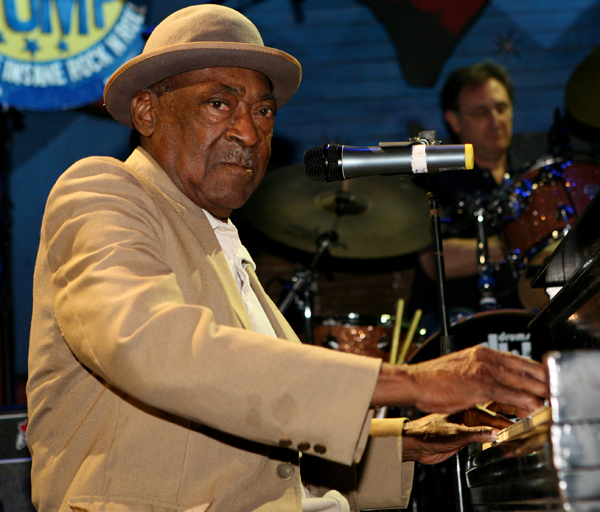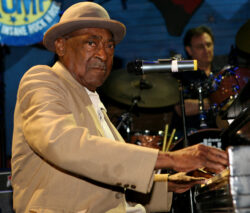Henry Gray
Henry Gray was a pioneer of the Chicago blues style of piano.

Courtesy of Gary LoVerde
Henry Gray. LoVerde, Gary (Photographer)
Pianist Henry Gray played a central role in the development of the urban blues style associated with Chicago. During the 1950s and 1960s, Gray played and recorded with blues musicians such as Howlin’ Wolf, Big Maceo Merriwether, Muddy Waters, “Little” Walter Jacobs, and Buddy Guy. Though much of his early career was spent in Chicago, Gray lived in Baton Rouge, where he grew up, from 1968 until his death in 2020. He traveled throughout the United States and Europe recording and playing at festivals ranging from the New Orleans Jazz & Heritage Festival to the Montreal Jazz Fest to the San Francisco Blues Festival. He received a Grammy nomination in 1988 and, in 2006, the National Endowment for the Arts named him a National Heritage Fellow.
Henry Gray, an only child, was born on January 19, 1925, in Kenner and grew up on a farm near Baton Rouge. He learned to play piano from a neighbor who recognized his interest in music. By the age of twelve, he was spending his free time away from the cotton fields visiting the churches and juke joints nearby and attempting to imitate the piano styles he heard inside. After serving in World War II, he joined the rural migration north to Chicago, where he had relatives. After working with bluesman Big Maceo Merriwether, he became the piano player in the legendary Howlin’ Wolf’s band in 1956. Throughout the fifties and sixties, Gray helped shape the Chicago blues piano style and wrote some enduring blues songs. His first recording session was in 1952 with Jimmy Rogers, a blues musician from Mississippi. Chess Records frequently hired him for studio work, as did the Excello label in Louisiana.
In 1968, Gray returned to Louisiana to help his mother after his father died. He continued to play local clubs while working as a roofer for the East Baton Rouge Parish School Board. Although popular groups such as the Rolling Stones were drawing attention to the urban blues styles of Chicago, Gray chose to emulate the swamp blues style of his native region. During the last twenty years of his life, he recorded a number of well-received solo albums and began touring and appearing at festivals. He played at almost every New Orleans Jazz & Heritage Festival during this time and, in 1988, he played at Mick Jagger’s fifty-fifth birthday celebration.
New Orleans Jazz Museum Music Curator Dave Kunian says, “If you’ve listened to blues music in the last half-century, you’ve heard pianist Henry Gray…he recorded and played for everybody…[and] helped create the blueprint for Chicago blues piano and all that it would be… whenever you hear someone play a familiar blues riff or turnaround on the piano, there is a good chance they learned it from Henry Gray — or someone who learned it off Henry Gray.”
Henry Gray passed away on February 17, 2020, at the age of 95.
Adapted from a biography provided by the National Endowment for the Arts.
